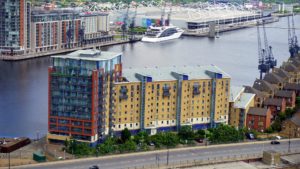
Before you start a business in an industrial area in Florida, you need the proper licenses, permits, and regulations. While regulations vary from one industry to another, it’s important to understand the zoning and land regulations in the area where your business is to open.
Failing to comply with regulations can result in a costly exercise of correcting issues, paying fines, and putting your business at risk before you’ve even started.
Different Zones for Different Uses
Zoning ordinances list allowable uses for different zoning districts. Typically, each allowable use is listed as a “Conditional Use” or a “Permitted Use.”
Conditional uses are subject to local government review. Usually, the government imposes conditions on use, like stormwater control or extra parking. On the other hand, permitted uses are outright allowed, but you may still need a permit for your business in an industrial area.
Requirements and Restrictions for Land Use
When it comes to zoning, land is clearly classified into particular districts. The most common classifications are:
- Industrial
- Commercial
- Residential
- Recreations
- Agricultural
You can also break down each classification into subcategories. For instance, mixed-use zoning includes a work-live zone where you’ll find manufacturing and small-scale retail in among residential dwellings.
To determine what district your business property falls in, you need to take a look at the applicable zoning map. The map makes up part of the zoning ordinance. If you’re unable to find a zoning map online for your particular area, the local planning government can direct you toward a copy.
What You Should Know About Industrial Zoning
Industrial zoning tends to be specific to the type of business you plan on starting. Environmental factors such as noise concerns are the type of issues that determine which industrial level your business will fall under. Many storage facilities along with manufacturing plants have industrial zoning permission.
On the whole, industrial zoning tends to be dependent on building height and amount of lot coverage, in other words, the land area that is covered by all the buildings on a lot.
Setback requirements are higher for industrially zoned properties. This refers to the distance between the property line and the building. A setback assures space between buildings and roads for a wide range of purposes, like utilities and drainage.
Starting a Business in An Industrial Area
Opening a new business location involves a list of inspections and permits. Fortunately, the state provides direct assistance to guide you through the process.
For most businesses, the zoning section of the Department of Community Development Planning Division is the first port of call to determine whether or not your business location is consistent with land use and zoning regulations. It’s a good idea to check with zoning officials before you sign a purchase agreement or lease. As your business expands, keep in mind that changing circumstances may trigger new zoning requirements.
Potential Zoning Issues
In a perfect world, you’d find a property for your business permitted as a conditional use or even outright. But if you really want to open your business in a zoning area that doesn’t permit your particular business, you’ll need to find out if there is an exception to the zoning. You may just qualify for a “variance” or even “non-conforming use.” You could even apply for a zone change.
Variances are an exception to the requirements of a certain zoning ordinance. You usually need to show some type of hardship to get a variance, for example:
- Not enough land available to buy at a reasonable cost to create parking for your business
- A small lot on which you need a variance to construct a useful structure
A non-conforming use is when the earmarked land use preexists current land use regulations. Often, a use is non-conforming when:
- The building doesn’t conform to the zoning ordinances, such as being higher than current allowances
- The activity in the building doesn’t conform, such as when zoning classification changes from industrial to light commercial
In some situations, it’s unfair if a company developed property in conformance with laws at the time and had to then relocate when zoning laws changed. Getting a variance approval or a zone change is a complicated and often costly process. That’s why it’s important to talk to an experienced land use attorney before you commit to a location where zoning is a potential issue.
Before You Open Your Business
As you can see, there are a number of issues that can crop up when you want to open a business in an industrial area. Before you even consider opening your business’s doors, you should consult with an attorney to acquire a comprehensive analysis of your property rights and code compliance in Florida State.
Book a consultation with Principal Law Firm today to discuss your options.
Image: Pexels



